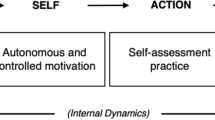Abstract
Problem-based learning is a constructivist approach to professional education stressing the use of real life problems in education. Several previous attempts to understand the intricacies of learning in the problem-based context have led to a causal model, elements of which were tested in the present study. The focus of the investigation was on the students’ motivation to commit themselves to studying in a problem-based health sciences curriculum, expressed in term of levels of attendance at tutorial meetings. Data were collected regarding functioning of the tutorial group, tutor functioning, level of prior knowledge, quality of the instructional problems, time spent on individual study, academic achievement and increased interest. These data were analyzed using a structural equations modeling approach. As hypothesized, commitment appears to be a potent determinant of achievement. In fact, it represents one of the strongest determinants of learning in the model tested.
Similar content being viewed by others
References
Arbuckle, J.L. (1997). Amos Users' Guide; version 3.6. Chicago, IL: Small Waters Corporation.
Barrows, H.S. (1983). ';Problem-based, self-directed learning';, Journal of the American Medical Association 250, 3077–3080.
Bentler, P.M. (1989). EQS: Structural Equations Program Manual. Los Angeles, CA: BMDP Statistical Software Inc.
Bloom, B.S. (1976). Human Characteristics and School Learning. New York: McGraw-Hill.
Bollen, K.A. (1989). Structural Equations with Latent Variables. New York: Wiley.
Boud, D. and Feletti, G. (1997). The Challenge of Problem-based Learning. London, UK: Kogan.
Browne, M.W. and Cudeck, R. (1993). ';Alternative ways of assessing model fit';, in Bollen, K.A. and Long, J.S. (eds), Testing Structural Equation Models. Newbury Park, CA: Sage, pp. 136–162.
Carroll, J.B. (1963). ';A model of school learning';, Teachers College Record 64, 723–733.
Cooley, W.W. and Lohnes, P.R. (1976). Evaluation Research in Education. New York: Irvington.
Gijselaers, W.H. and Schmidt, H.G. (1989). ';Towards a causal model of student learning within the context of a problem-based curriculum';, in Nooman, Z., Schmidt, H.G. and Ezzat, E. (eds), Innovation in Medical Education, an Evaluation of its Present Status. New York, NY: Springer Publishing, pp. 95–113.
Hmelo, C.E. (1998). ';Problem-based learning: Effects on the early acquisition of cognitive skill in medicine';, The Journal of the Learning Sciences 7, 173–208.
Lawton, D. (1980). The Politics of the School Curriculum. London: Routledge and Kegan Paul.
Marsh, H.W. (1980). ';The influence of student, course, and instructor characteristics in evaluation of university teaching';, American Educational Research Journal 17, 217–237.
Norman, G.T. and Schmidt, H.G. (1992). ';The psychological basis of problem-based learning: A review of the evidence';, Academic Medicine 67, 557–565.
O'Donnell, A.M. and King, A. (eds) (1999). Cognitive Perspectives on Peer Learning. Mahwah, NJ: Lawrence Erlbaum.
Pontecorvo, C., Amigues, R., Blaye, A. et al. (1990). ';Social interaction in learning and instruction';, in Mandl, H. and de Corte, E. (eds), Learning and Instruction: European Research in an International Context. Oxford, UK: Pergamon, pp. 1–126.
Schmidt, H.G. (1999). ';Testing a causal model of problem-based learning';, Paper presented at the Annual Meeting of the American Educational Research Association, Montreal, CA, April 19-23, 1999.
Schmidt, H.G. and Gijselaers, W.H. (1990). ';Causal modeling of problem-based learning';, Paper presented at the Annual Meeting of the American Educational Research Association, Boston, MA, April 16-22.
Schmidt, H.G., Dolmans, D.H.J.M., Gijselaers,W.H. and Des Marchais, J.E. (1995). ';Theory-guided design of a rating scale for course evaluation in problem-based curricula';, Teaching and Learning in Medicine 7, 82–91.
Schmidt, H.G., de Volder, M.L., de Grave, W.S., Moust, J.H.C. and Patel, V.L. (1989). ';Explanatory models in the processing of science text: The role of prior knowledge activation through small-group discussion';, Journal of Educational Psychology 81, 610–619.
Silver, M. and Wilkerson, L. (1991). ';Effects of tutors with subject expertise on the problem-based tutorial process';, Academic Medicine, 66, 298–300.
Steiger, J.H. (1990). ';Structural model evaluation and modification: An interval estimation approach';, Multivariate Behavioral Research 25, 173–180.
Van Berkel, H.J.M., Nuy, H.J.P. and Geerligs, T. (1995). ';The influence of progress tests and block tests on study behavior';, Instructional Science 22, 315–331.
Vernon, D.T. and Blake, R.L. (1993). ';Does problem-based learning work? A meta-analysis of evaluative research';, Academic Medicine 68, 550–563.
Webb, N.M., Troper, J.D. and Fall, R. (1995). ';Constructive activity and learning in collaborative small groups';, Journal of Educational Psychology 8, 406–423.
Author information
Authors and Affiliations
Rights and permissions
About this article
Cite this article
Van Berkel, H.J., Schmidt, H.G. Motivation to commit oneself as a determinant of achievement in problem-based learning. Higher Education 40, 231–242 (2000). https://doi.org/10.1023/A:1004022116365
Published:
Issue Date:
DOI: https://doi.org/10.1023/A:1004022116365




